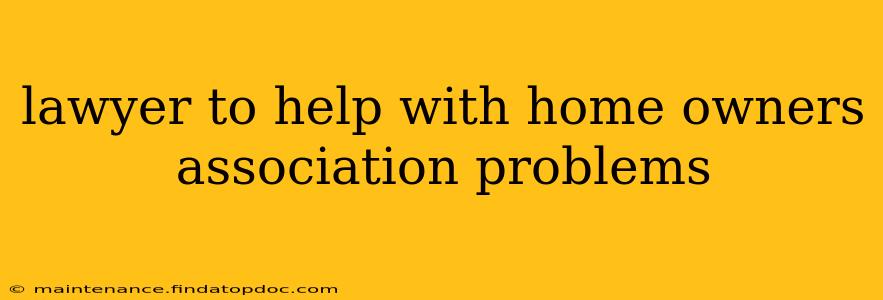Navigating the complexities of a Home Owners Association (HOA) can sometimes feel like traversing a minefield. Disputes over architectural changes, assessments, violations, or even board decisions can quickly escalate into frustrating and costly legal battles. Knowing when to seek legal counsel and finding the right lawyer to handle your HOA problems is crucial to protecting your rights and property. This guide will help you understand when you need a lawyer and how to find the best one for your specific situation.
When Do I Need a Lawyer for HOA Issues?
Many HOA disputes can be resolved amicably through communication and negotiation. However, some situations demand legal intervention. Here are some key indicators that you should consult a lawyer:
-
Formal Accusation of Violation: If your HOA formally accuses you of violating the covenants, conditions, and restrictions (CC&Rs) and threatens legal action, seeking legal counsel is essential. Ignoring the accusation can lead to significant penalties.
-
Unfair or Discriminatory Enforcement: If you believe the HOA is selectively enforcing rules or acting in a discriminatory manner against you, legal representation can help ensure fair treatment.
-
Dispute Over Assessments or Fees: Disagreements about special assessments, late fees, or other charges often require legal intervention to clarify your responsibilities and challenge unwarranted fees.
-
Collection Efforts: If the HOA is pursuing aggressive debt collection tactics, a lawyer can help you negotiate a payment plan or defend against unwarranted actions.
-
Board Misconduct or Illegal Activity: If you suspect the HOA board is engaging in illegal activities or violating its own governing documents, legal action may be necessary to protect your interests.
-
Major Construction or Renovation Disputes: Disagreements about architectural review, permitted modifications, and construction projects often necessitate legal intervention to resolve disputes and protect your investment.
What Type of Lawyer Should I Look For?
While any experienced attorney can assist with some HOA issues, it's beneficial to seek a lawyer specializing in real estate law, community association law, or homeowner association law. These lawyers have a deep understanding of the intricacies of HOA governance, CC&Rs, and relevant state laws.
How Can I Find a Good HOA Lawyer?
Finding the right lawyer involves careful consideration:
-
Referrals: Ask friends, neighbors, or real estate professionals for recommendations. Word-of-mouth referrals are often valuable.
-
Online Searches: Use online search engines, including Google, Bing, and Avvo, to find lawyers in your area specializing in HOA law. Review online profiles and client reviews carefully.
-
State Bar Associations: Many state bar associations maintain online directories of attorneys. You can search for lawyers specializing in real estate or community association law within your jurisdiction.
-
Free Consultations: Many lawyers offer free initial consultations. This allows you to discuss your case, assess their expertise, and determine if they're the right fit.
What Questions Should I Ask a Potential Lawyer?
During your initial consultation, be sure to ask these crucial questions:
- Experience with HOA cases: Inquire about their experience handling similar cases and their success rate.
- Fees and billing practices: Understand their fees, payment schedules, and whether they offer contingency fees.
- Communication style: Ensure they communicate effectively and provide regular updates.
- Legal strategy: Discuss their approach to your case and their anticipated timeline.
What Happens After Hiring a Lawyer?
Once you've chosen a lawyer, they will guide you through the necessary steps, which may include:
- Negotiation: Attempting to resolve the dispute outside of court.
- Mediation: Using a neutral third party to facilitate a settlement.
- Arbitration: Submitting the dispute to an arbitrator for a binding decision.
- Litigation: Filing a lawsuit if negotiations and alternative dispute resolution fail.
Resolving HOA disputes can be challenging, but with the right legal counsel, you can protect your rights and find a favorable resolution. Remember to document everything, from communications to evidence of violations or damages. This thorough documentation is invaluable in building a strong case.
